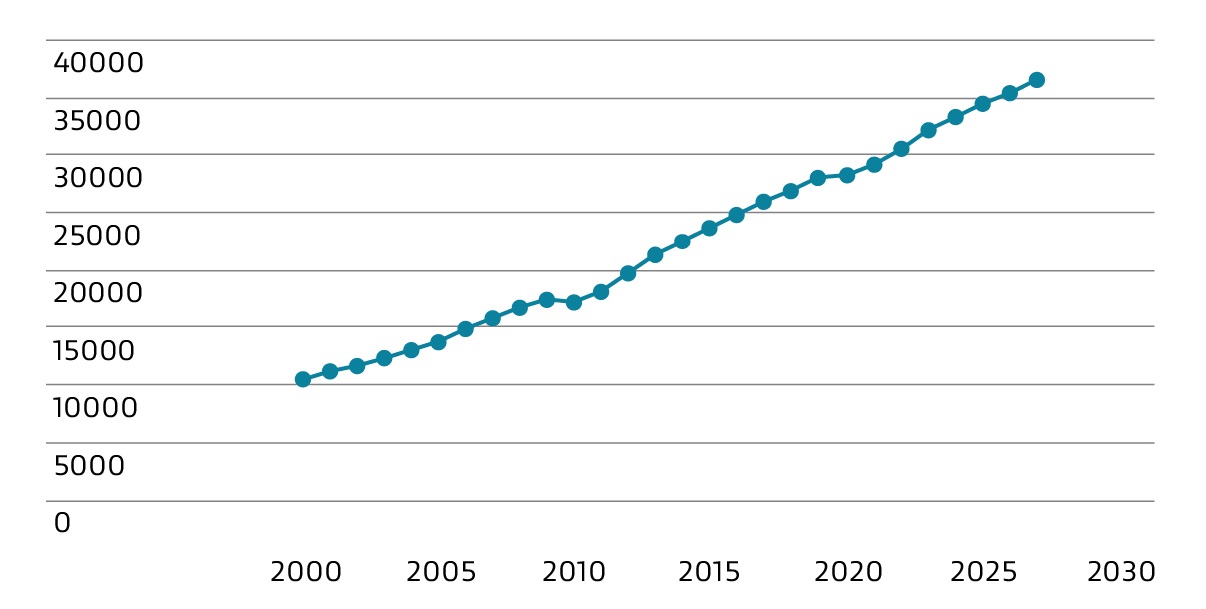Technological futures – Shaping the digital skills of the future workforce
The RSLG wants to play a part in addressing the gap between those with digital skills and those who experience digital exclusion.
On this page

Photo: Auckland Unlimited
Lifting the digital capability of Small and Medium Enterprises (SMEs) and enabling them to compete better on the global market and drive efficiencies and productivity gains through technology will require a shift in education and learning systems. The Digital Technology Industry Transformation Plan and related programmes such as MBIE’s Digital Boost initiative are examples of action underway for the region to leverage.
If Tāmaki Makaurau is to support a productive and prosperous labour market, then equitable distributions of the region’s economic prosperity must be one of its key characteristics. This can only be achieved if employers invest in raising the digital and technical skills of their existing staff and by educators delivering skills development and training programmes aimed at creating a highly skilled and technology enabled Tāmaki Makaurau of the future.
The ‘future of work’ requires an improvement in labour productivity and jobs in this sector are high value, coming under the Professional, Scientific and Technical services occupation and the Information, Media and Telecommunications industry. They are defined as digital skills and include ICT roles which require limited prior qualifications and training. An earlier survey of 58 secondary schools with over 61,000 students found that fewer than 6% of these students were able to gain a qualification that demonstrates to a prospective employer that they are ‘job ready’ and equipped with the ICT skills suitable for taking up a job. The future of work will impact the region’s people and industry locally and globally, and the region will need new skills and new insights to upskill its workforce to adapt to digital innovations.
Digital literacy the key to NZ’s ICT skills shortage(external link) — 20/20 Trust
COVID-19 has seen remote working, flexible working and distributed workforces become the norm, and this trend will continue to impact the region’s workforce. The future jobs for Tāmaki Makaurau will look quite different to what is available now. The region needs to develop new ways of working and adapt to our dynamic labour market to trial new methodologies for upskilling and retraining our workforce as we adjust to the changing nature of work. Our youth must be prepared for the challenges of COVID-19-related remote work and lead this change to create a digitally enabled and agile labour market. Information on rates of attendance, completion and achievement at schools and tertiary institutions is not yet available for the current year, but there are indications that in these areas all learners were affected to varying degrees by COVID-19. The effects appear to have been amplified by existing inequities, such as inadequate access to digital devices, lack of connectivity and challenging home environments.
Employment levels and forecast for ICT professionals in Auckland 2000-2027

Source: Infometrics
Text description of chart
The Southern Initiative (TSI) reports that 20% of South Auckland households are without internet at all and many more without reliable internet. It is becoming clear that we must view digital connectivity as a human right and on par with other forms of infrastructure, like water and power. The first lockdown showed us the depth of digital inequity in South and West Auckland, and the second lockdown hammered home that access and internet does not equate to digital inclusion.
To take advantage of the opportunities of a digitally enabled workforce, and mitigate challenges related to access and equity of digital skills, the region needs to act now, and to identify where the future demand for workers will be and what education, training and immigration settings are required to deliver an appropriately skilled future workforce.
If the region wants to improve productivity, deliver a better health system, create high value jobs that capitalise digital skills and help companies recover from COVID-19 by being more efficient and accessing international markets, the region will need to increase the number of digital technology professionals in Tāmaki Makaurau.
Equity in education is key to the journey for rangatahi(external link) — The Southern Initiative
The internet as a human right(external link) — The Brookings Institution
Digitally, we aren't ready for this pandemic(external link) — E-Tangata
Digital inclusion and wellbeing in New Zealand(external link) — Motu
ICT and tech sector workforce planning challenges
- While all sectors are experiencing skills shortages across all business sectors in Tāmaki Makaurau, critical digital skills (including advanced skills) shortages are impacting all parts of the economy.
- There is a need to assist all Aotearoa New Zealanders to understand the importance of digital skills. The skills issue is not about the tech sector; it is about the future of work. There is a strong need to increase the understanding of the importance of lifelong learning and digital technologies.
- The digital roles in Tāmaki Makaurau require both advanced and early career digital skills. Jobs are forecast to grow in these roles. However, it is expected that there could be an ongoing requirement for skilled people to fill opportunities created by people leaving the labour market.
- There are 29,089 filled jobs as part of ICT roles in the Tāmaki Makaurau region, representing the highest number of jobs in ICT roles across the country (46%). However, there is not always an equitable distribution of these jobs with Māori employees representing only 1,656 employees in ICT roles, constituting about 6% of the workforce.
- The Digital Skills Aotearoa survey highlights a lack of coordinated effort leading to a skills mismatch. Local education pathways not producing sufficiently experienced talent and industry force a reliance on immigration to support growth.
- Technological drivers like automation of routine roles and uptake of new technologies are predicted to change 25% of Tāmaki Makaurau region’s employment growth towards higher-skilled knowledge intensive roles. A skills shortage of high-end digital skills such as programmers and software engineers due to a tight labour market and competition for limited skills has created wage inflation for these roles, especially as the public sector has been increasing salaries to hire software engineers while small businesses are struggling.
- Public sector and global competition have driven up wages due to a limited pool of resources within the country. This has stifled entrepreneurship in small start-ups. There is a need to support the region’s digital skills ecosystem to move towards technology-enabled digital skills and boost the productivity of the region’s youth through these skills.
ICT Sector Salary Guide(external link) — Recrut I.T. Auckland
"The Silver Bullet"(external link) — Recruit I.T. Auckland
Digital Skills Aotearoa: Digital Skills For Our Digital Future [PDF, 6.84 MB](external link) — New Zealand Digital Skills Forum
NZ tech sector "seriously restricted" by skills mismatch(external link) — I.T. Brief New Zealand
Digital skills actions
- The RSLG supports urgent and critical action required to ensure the minimum sustainable workforce pipeline meets regional demand for digital skills and advanced digital roles (including software engineers).
- The RSLG supports connections with industry partners, including Microsoft, Facebook, Meta, Google, Amazon and IBM along with tertiary education providers to mitigate equity and access gaps for digital skills. This will ensure access and timing of funds are aligned with industry partners’ investment.
- The RSLG promotes the creation of a space for collaboration with industry. This space will promote digital skills for Māori by Māori and align digital skills training with business needs.
- The RSLG supports the development of career pathways for Māori by Māori through the delivery of micro-credentials in digital skills for Māori students under 30 (a high proportion of the Māori population in Tāmaki Makaurau).

